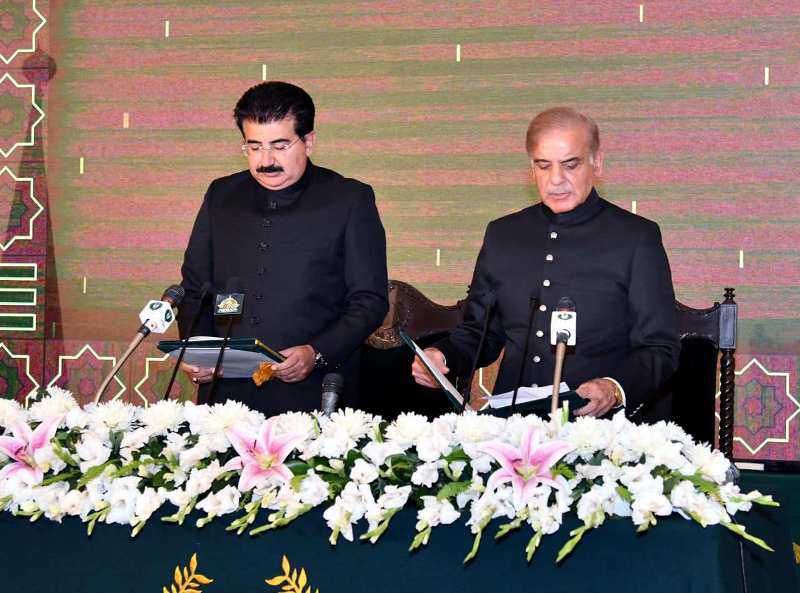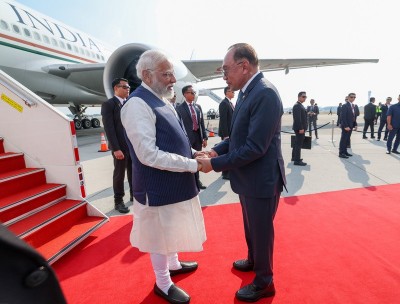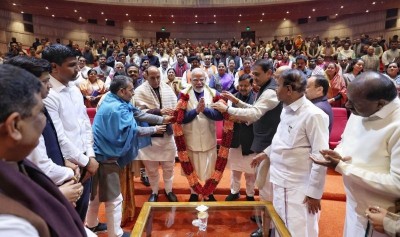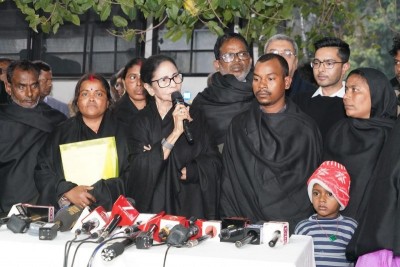 Pakistan New Government
Pakistan New Government
As it grapples with challenges inherited from Imran Khan, the focus of Pakistan’s new government should be on regional peace
A historical event in Pakistan’s political trajectory was witnessed in the wee hours of 10 April, when after much dramatic fuss and needless political wrangling and feet dragging by the then Prime Minister Imran Khan, the no-trust vote against him was finally held and yielded a narrow Opposition victory.
Khan thereby became saddled in perpetuity with the ignominy of becoming the first Prime Minister in the country’s tumultuous political history to be booted out through the electoral expression of parliament’s loss of trust in him.
The Opposition, which won 174 votes in the 342-member National Assembly, the minimum required to topple Khan being 172, the next day picked senior Pakistan Muslim League – Nawaz (PML-N) leader Shehbaz Sharif, the younger brother of party supremo and three-time former PM Nawaz Sharif, as the country’s new Prime Minister.
Aided actively by the Supreme Court’s expression of clear support for democratically correct practices, as also the military establishment’s ostensibly neutral position through the entire no-trust vote saga, the sense that democracy had at long last prevailed, even if fleetingly, in Islamabad was palpable.
As the euphoria of the victory fades, though, the enormity of the challenge that Khan has bequeathed to Shehbaz Sharif will begin to hit home.
Nobody in Pakistan, or elsewhere for that matter, was oblivious to the utter mess that Khan was lording over.
The economy was literally in shambles and the situation only threatened to get worse as the debt obligations to China for projects under the China-Pakistan Economic Corridor (CPEC) loomed.
An editorial in The Dawn daily was of the view that “Fixing the broken economy is probably the most formidable challenge facing Mr. Sharif’s cabinet”.
Meanwhile, fundamentalist groups were regularly browbeating the government into acceding to their extreme and unreasonable demands, Pashtun and Baloch terrorist groups were targeting Pakistani and Chinese interests at will from their bases in Afghanistan and Iran, and Khan, with a particular single-mindedness, was going about wreaking havoc in most foreign relationships that successive Pakistani regimes had valued highly and held dear.
These included, remarkably daftly, relations with the United States (US) and Saudi Arabia, to name only a couple.
As James Schwemlein, a senior director at the Washington-based Albright Stonebridge Group, told CNBC, Khan’s antagonism to the US was “dangerous” for Pakistan.
He added, “The dream for Pakistan is that they can export to China. The reality for Pakistan is that they export to the US and Europe”.
Nevertheless, the only country that seemed to matter to Khan was China.
Sharif, quite evidently, will have his hands full through every single day of his year-and-a-half term if he were to seriously attempt to even partially address just one of these challenges, leave aside all of them.
And he will have to attempt it while navigating the many tricky questions that coalition politics brings, especially when the two largest coalition partners have themselves been locked over decades in highly competitive and combative politics.
Imran Khan, meanwhile, will be roaring for revenge at all costs.
Despite such a thorny and complex milieu confronting him, the one telling factor that may work in Shehbaz’s favour is that the powerful military establishment, disillusioned by the failed experiment with Imran Khan, appears to be backing him at this stage.
As Michael Kugleman, senior associate for South Asia at the Washington-based Wilson Centre told The Print, “No top Pakistani opposition leader has a closer relationship with the military than Shehbaz.
He has avoided confrontational positions toward the military and tried to stay above the fray, and this has helped him enjoy a favourite son status”.
In addition to the disillusionment with Imran Khan, the military establishment’s publicly articulated inclination towards better relations with its neighbours, especially with India, could also have played a role in its siding with an accommodative Sharif as against a perpetually confrontational Khan.
The Sharif siblings have usually had “cordial relationships” with Indian leaders, said Imtiaz Gul of the Center for Research and Security Studies in Islamabad.
“This is a good entry point basically for India to resume dialogue”, he added.
Nawaz Sharif, whose shadow is likely to loom large over the new government, reportedly has good working relations with Indian Prime Minister Narendra Modi, and Shehbaz Sharif as the Chief Minister of Pakistani Punjab was known to have made efforts to strengthen people-to-people and economic ties with Indian Punjab, always keeping dialogue open.
During a visit to India in 2013, Shehbaz had told journalists that “war is not an option” and he had backed the resumption of “peaceful dialogue” on all issues, including “Sir Creek, Siachen, water and Kashmir”.
Like Army Chief General Qamar Javed Bajwa earlier this month, both the Sharif brothers have on more than one occasion spoken in favour of better relations between Pakistan and India.
After all, improving ties with India will help Pakistan’s development agenda and provide a much-needed boost to the country’s flailing economy.
This is not the first time that the prospect of the two countries ironing out their differences has seemed to be on the horizon.
Earlier instances had only flattered to deceive, with the notable exception being the Agra Summit in July 2001 between the Pakistani dictator General Pervez Musharraf and the respected Indian leader Atal Bihari Vajpayee which had generated a fair bit of optimism.
While the present state of play is nowhere near as close as the Agra Summit got, substantial behind the scenes progress seems to have been made for serious talks to take over.
What gives the ongoing initiative an air of seriousness is that the Pakistani military establishment appears to be firmly behind it, and may even be spurring it on.
The establishment now seems to have got the right political company to take the process forward in earnest.
The tone from the Indian side also suggests an inclination towards dialogue and resolution of issues.
Congratulating Shehbaz Sharif on his election as the Prime Minister, his Indian counterpart Narendra Modi said that India desired peace and stability in a region free of terror.
He wrote, “Congratulations to H. E. Mian Muhammad Shehbaz Sharif on his election as the Prime Minister of Pakistan. India desires peace and stability in a region free of terror, so that we can focus on our development challenges and ensure the well-being and prosperity of our people”.
Coming from the very top, Modi’s message was a positive affirmation of peace.
It, however, also unambiguously underlined India’s main concern over terrorism emanating from Pakistan.
Not only has such terrorism had a deadly impact on India’s security, especially in Jammu & Kashmir (J&K), where thousands have lost their lives to it, but it has in recent times emerged as the inevitable culprit each time the prospect of dialogue between Pakistan and India has seemed imminent.
The sentencing of United Nations (UN)-designated Lashkar-e-Taiba (LeT) terrorist, Hafiz Saeed, who also has a $10 million bounty on his head from the US, this past week was a reminder of the horrors India has had to endure from Pakistan-sponsored terrorism.
Of all the thousands of ruthless and dreaded Pakistani terrorists, none evokes such disgust and hatred in India as Hafiz Saeed does.
He had ordered innumerable mindless and destructive terrorist attacks in India, the most damaging of which was the Mumbai attacks of 2008.
India’s repeated demands that Saeed be tried and punished had fallen on deaf Pakistani ears till lately.
Perhaps to send a positive message to India as a demonstration of intent before the talks, or equally likely to evade damaging punitive action by the Financial Action Task Force (FATF), on whose adverse watch Pakistan has been for the past several years, the sentencing last week of the establishment’s erstwhile close and trusted asset to 33 years in prison by an anti-terrorism court is significant.
Saeed had earlier been sentenced in 2020 to 15 years in jail in another of the several terror financing cases against him.
Pakistan needs to now ensure that Saeed is unable to evade actual incarceration in violation of the sentence as he has all too often done in the past, lest that become a tame spoiler.
Shehbaz Sharif responded to Modi’s call for peace by thanking him for his felicitations and saying that his country desires “peaceful and cooperative” ties with India.
Just as Modi had pointed to terrorism as a core issue that required to be addressed, Sharif emphasized that peaceful settlement of outstanding bilateral disputes, including J&K, was indispensable.
He tweeted, “Thank you Premier Narendra Modi for felicitations. Pakistan desires peaceful and cooperative ties with India. Peaceful settlement of outstanding disputes including Jammu and Kashmir is indispensable”.
Reacting to Modi’s pointed reference to terrorism, Shehbaz added, “Pakistan’s sacrifices in fighting terrorism are well-known. Let’s secure peace and focus on the socio-economic development of our people”.
This dismissive Pakistani attitude towards its well documented role in fomenting terror, if allowed to fester, could also be a dampener to peace moves.
As Al Jazeera pointed out in a recent article, human rights organizations have documented the killing of thousands of innocent people in Pakistan-backed terrorism against New Delhi since 1989.
The new Shehbaz Sharif government took its denials a step further when it hit out at both India and the US over the reference in their 12 April joint statement asking Pakistan to prevent the use of territories under its control by terrorists.
Issued in Washington DC after the 2+2 talks between the foreign and defence ministers of India and the US, the joint statement said that “The ministers strongly condemned any use of terrorist proxies and cross-border terrorism in all its forms and called for the perpetrators of the 26/11 Mumbai attack, and the Pathankot attack, to be brought to justice."
They called for concerted action against all terrorist groups, including groups proscribed by the UNSC 1267 Sanctions Committee, such as Al-Qaeda, ISIS/Daesh, Lashkar-e-Tayyaba, Jaish-e-Mohammad and Hizb ul Mujahideen.
The ministers called on Pakistan to take immediate, sustained, irreversible action to ensure that no territory under its control is used for terrorist attacks.
Islamabad said the references in the statement “lacked credibility”.
If peace endeavors are to proceed with any degree of sincerity, a more honest assessment of its role in promoting terrorism would certainly be required from Pakistan.
Sharif’s call for “Peaceful settlement of outstanding disputes including Jammu and Kashmir” is more pertinent.
Quite obviously, all these disputes cannot be tackled in one fell swoop, and a graded approach would serve the complexities of the situation better.
However, at whichever stage it is taken up, there cannot be any doubt that resolution of the J&K issue is indeed a key to lasting peace in the region.
As Imran Nabi Dar, spokesman for the National Conference (NC), J&K’s oldest political party, told Al Jazeera, “The National Conference has always been a votary of dialogue between India and Pakistan. We would be the last to reject it. It is the Kashmiris who are suffering because of the hostilities between the two countries. We would love both the countries to sit down and resolve all their issues including Kashmir"
Professor Siddiq Wahid, a historian and international affairs expert, added, “We in Kashmir have known for a long time that peace between the two countries is of paramount importance for the resolution of the conundrum that is Jammu and Kashmir. But equally important requirements are those of honesty and transparency in the event they do resume a dialogue."
"Honesty here would require addressing all of Jammu and Kashmir, including Gilgit, Baltistan and Ladakh. And transparency would involve taking all the peoples of the territories of erstwhile State of Jammu and Kashmir into confidence before and during their dialogue," he added.
Resolution of the J&K issue will, undoubtedly, be in the best interests of all involved, whether that be India and Pakistan, both of which can then move on to what they really wish to do – ensure development and economic prosperity for their massive populations.
The whole of South Asia will stand to gain significantly from the economic integration that resolution of issues between Pakistan and India, especially the J&K issue, promises to encourage.
The wider international community, periodically concerned over rising tensions between the two nuclear neighbours over J&K, would also be able to breathe a sigh of relief.
Most importantly, it will be the entire population of the erstwhile Princely State of Jammu and Kashmir, presently living divided in uncertainty and apprehension, which will benefit from peace and the concomitant rekindling of their faith, hopes, dreams and aspirations.
Support Our Journalism
We cannot do without you.. your contribution supports unbiased journalism
IBNS is not driven by any ism- not wokeism, not racism, not skewed secularism, not hyper right-wing or left liberal ideals, nor by any hardline religious beliefs or hyper nationalism. We want to serve you good old objective news, as they are. We do not judge or preach. We let people decide for themselves. We only try to present factual and well-sourced news.







